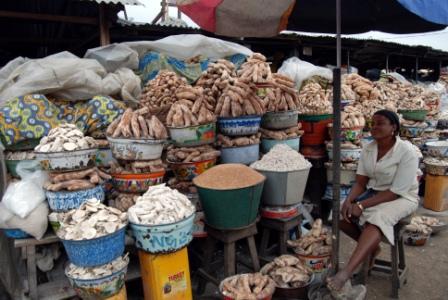Breaking News
Nigeria’s Inflation Rate Increased To 18.72 Per cent

From 18.55 per cent in December 2016, Nigeria’s inflation rate increased to 18.72 per cent in January 2017, the National Bureau of Statistics, NBS, has said.
According to the Bureau, the Consumer Price Index, CPI, which measures inflation increased by 18.72 per cent (year-on-year) in January 2017, 0.17 percentage points higher from the rate recorded in December; and increases were recorded in all divisions that yield the Headline Index.
The report, released by the NBS on Wednesday, stated that communication and restaurants and hotels again recorded the slowest pace of growth in January, growing at 5.1 per cent and 8.4 per cent (year-on-year) respectively.
The NBS, however, said that the faster pace of growth in headline inflation, year on year, were bread and cereals; meat, fish, oils and fats; potatoes, yams and other tubers; wine and spirits: clothing materials and accessories. Others are electricity, cooking gas, liquid and solid fuels; motor cars and maintenance; vehicle spare parts and fuels; and lubricants for personal transport equipment as well as passenger transport by road.
According to the report, on a month-on-month basis, headline inflation was driven by passenger transport by air, fuels and lubricants for personal transport equipment; liquid fuels, cooking gas, oils and fats; fruits, cheese and eggs; fish, meat and bread; as well as cereals.
The report noted that the Food index increased by 17.82 per cent (year-on-year) in January, up by 0.43 per cent points from rate recorded in December 2016 (17.39) percent. During the month, all major food sub-indexes increased, with soft drinks recording the slowest pace of increase at 7.8 per cent(year on year).
During the month, the highest increases were seen in housing, water, electricity, gas and other fuels, with education and transport growing at 27.2, 21.0 and 17.2 per cent respectively.
On a month-on-month basis, the Headline index increased although at a slower pace in January 2017. The index increased by 1.01 per cent point in January, 0.05 per cent points from 1.06 per cent rate recorded in December 2016.
The Urban index rose by 20.31 per cent (year-on-year) in January from 20.12 per cent recorded in December, and the Rural index increased by 17.34 per cent in January from 17.20 per cent in December.
On month-on-month basis, the Urban index rose by 1.03 per cent in January from 1.08 per cent recorded in December, while the rural index rose by 1.00 per cent in January from 1.04 per cent in December.
The corresponding twelve-month year-on-year average percentage change for the Urban index, the report said, increased from 17.05 percent in December to 17.91 per cent in January, while the corresponding rural index also increased from 14.54 per cent in December to 15.18 per cent in January.
According to the NBS, the Composite Food Index rose by 17.82 per cent in January 2017. The rise in the index, the bureau said, was mainly driven by increases in prices of bread and cereals, meat, oil and fats, and fish.
On a month-on-month basis, the Food sub-index increased by 1.29 per cent in January, down by 0.04 per cent points from 1.33 per cent recorded in December.
Meanwhile, the ”All Items Less Farm Produce” or Core sub-index, which excludes the prices of volatile agricultural produce eased by 17.9 per cent during the month, 0.20 per cent points from 18.1 per cent recorded in December as all key divisions which contributes to the index increased.
Also on a month-on-month basis, the Core sub-index increased by 0.68 per cent in January, 0.06 per cent points higher from 0.62 per cent recorded in December. The highest increases were recorded in electricity, gas, passenger transport by air, liquid fuel, fuel and lubricants for personal transport equipment and solid fuels.






